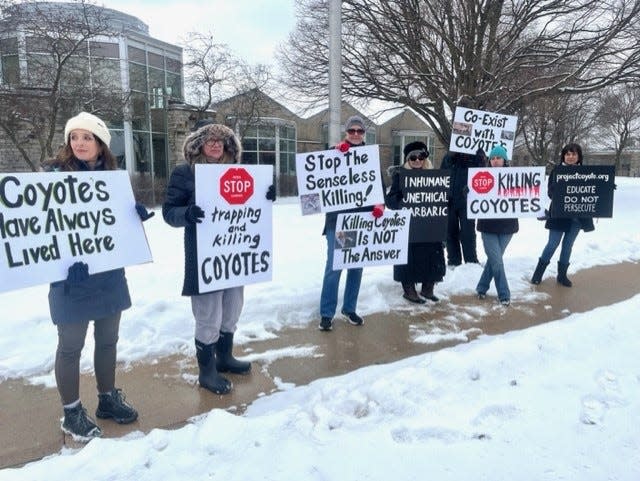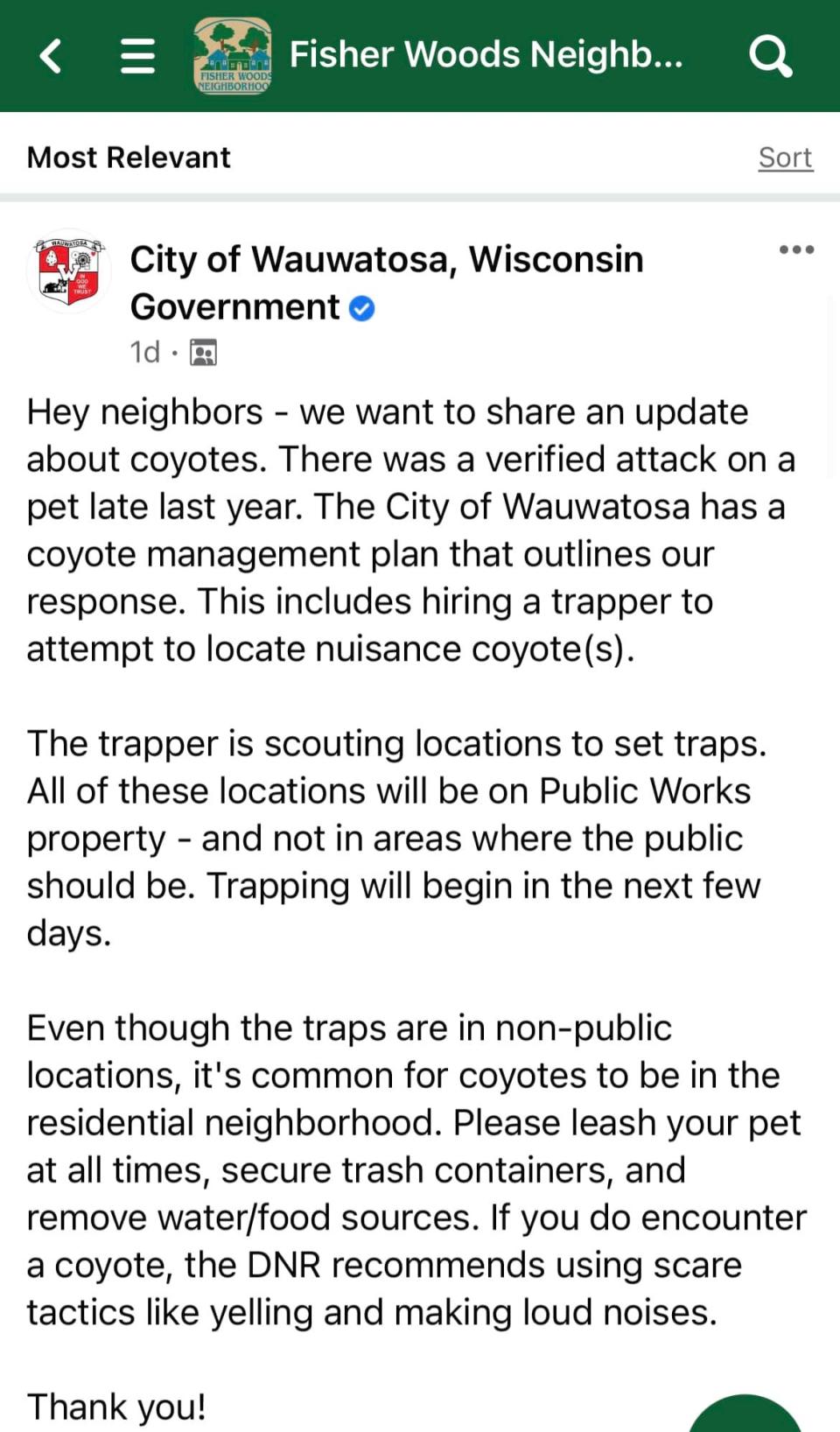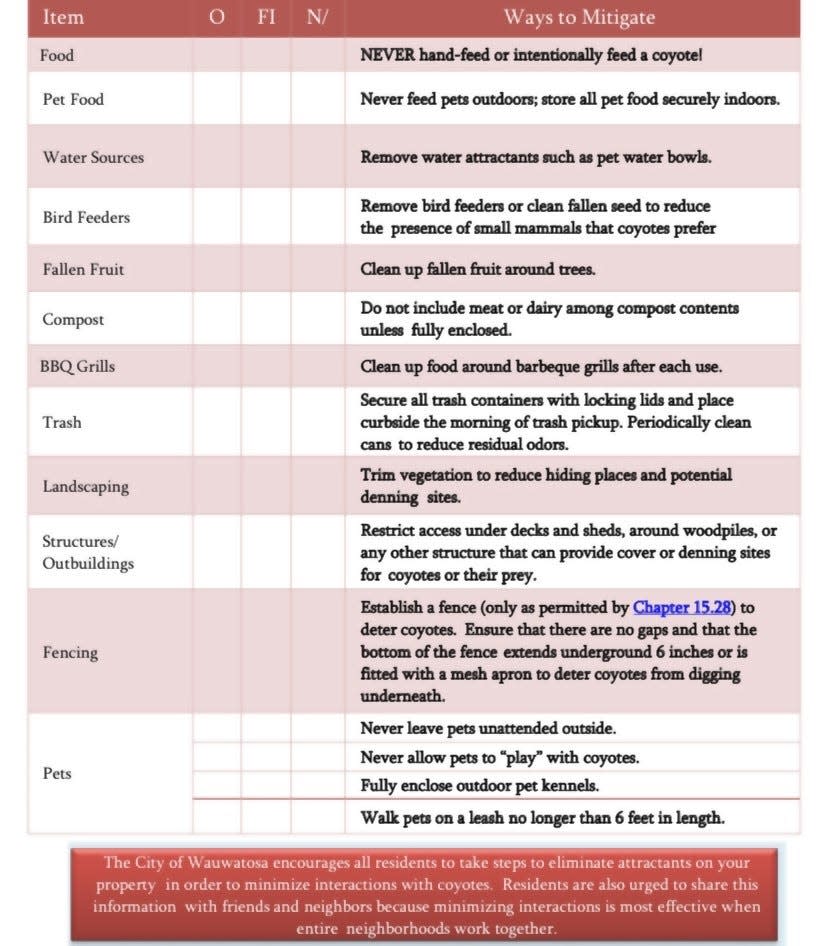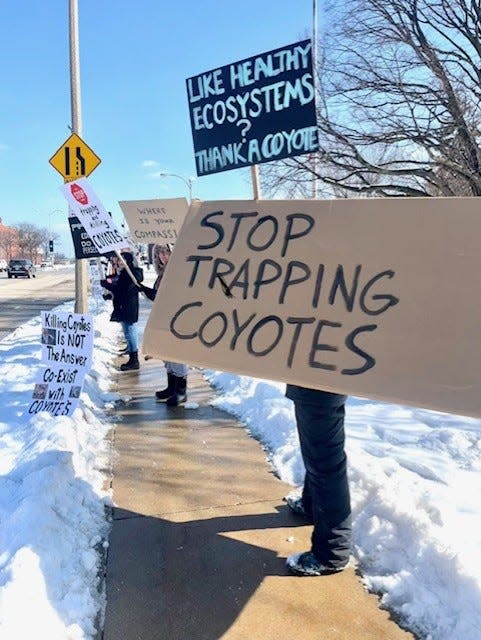In Wauwatosa, residents and animal rights activists are fighting the city over how to deal with nuisance coyotes

After a pet attack is verified in Wauwatosa, the city hires a trapper to capture and kill "nuisance" coyotes. The city announced coyote traps would be set out last month, and now animal advocates and experts are calling on officials to rethink Wauwatosa's coyote policy.
The Milwaukee chapter of animal rights network Direct Action Everywhere joined residents in front of the city's library on Feb. 25 to protest lethal measures that experts have called ineffective and counterproductive.
"The first and most important thing is, removing coyotes does not solve the issue of conflict," said Wauwatosa animal advocate Megan Scott. "In the end, we need to learn to coexist with them because it will just continue."
Traps set after owner says her dog was bitten by a coyote late last year
In October, a dog had to receive stitches after his owner discovered three puncture wounds on the lab's backside, a Wauwatosa police report said. While the owner did not witness the incident, she told police the bite was likely from a coyote as she's often seen and heard them in her backyard.

When police checked in with the pet owner this month, she told them that her husband had to save their dog a few weeks ago when there were multiple coyotes in their backyard, the report said.
Per Wauwatosa's Coyote Nuisance Management and Response Plan Policy created by the common council in 2016, the city then contacted local wildlife removal service Recon Trapping to set out traps on nearby public property.
Recon Trapping was referred to the city by the Wisconsin Department of Natural Resources, said Wauwatosa communications manager Eva Ennamorato.
Last year, the same trapper killed five coyotes for Wauwatosa after a dog was fatally attacked.
Coyote traps are nonlethal; however, the trapper fatally shoots the animal after it is captured.
City doesn't require its policy's nonlethal recommendations

Wauwatosa's coyote policy includes how to nonlethally prevent coyote attacks. It recommends removing attractants, such as food and water sources, and keeping pets supervised and leashed.
The city also recommends "hazing," or instilling fear in, coyotes by yelling, using sound devices or predator scents.
However, the policy does not require residents to follow through with these recommendations prior to resorting to lethal action.
"We do not verify information about hazing attempts or making sure food isn’t available," Ennamorato said.
The city won't hire a trapper when the pet is attacked while unleashed and off of its owner's property, Ennamorato said.
The city's community affairs committee on Feb. 28 discussed how to prohibit people from feeding wildlife.
Studies show prevention should be prioritized over lethal action
Madison-based researcher Francisco J. Santiago-Ávila is the science and conservation manager for the national nonprofit Project Coyote.
Studies show that the prevention methods listed in the city's policy are more effective than trapping and killing, said Santiago-Ávila, which is why they should be required before lethal action is implemented.
"(Residents) might not even be inclined to do their part and engage with these mitigation measures if they know that they just have to complain to the city and the city is going to implement lethal methods," said Santiago-Ávila.
When coyotes are killed, a "vacuum of space" is created for more coyotes to move in who are younger and less experienced, which will lead to more conflicts, he said.
"Generally, the consequence in the long term if you keep doing this is, more coyotes are going to be killed and more pets are going to be attacked," Santiago-Ávila said.
Additionally, setting out traps doesn't guarantee that the actual "nuisance" coyote is the one being killed, he said.
Santiago-Ávila said he realizes that some may not want to put in the extra effort to implement hazing efforts or remove attractants. However, learning how to coexist with coyotes is the actual long-term solution, he said.
"I think it could go a long way into just promoting good behavior on the part of humans that we know through, again, scientific studies, actually is effective at mitigating these issues," he said.
Wauwatosa should take after Milwaukee County's plan, protesters say

Milwaukee resident Lisa Castagnozzi of Direct Action Everywhere and the Milwaukee Animal Rights Network helped organize protesters on Feb. 25. Upon reading the city's policy, she questioned which department, exactly, authorized the trapping. She said she didn't receive a clear answer from the city.
"The city doesn’t have an animal control function," Ennamorato told the Journal Sentinel. "Depending on who receives the initial report, multiple staff members from different departments review the incident report and confirm the verified pet attack."
Megan Scott, who lives in Fisher Woods in Wauwatosa, also helped organize the protest. She's seen coyotes pass through her neighborhood, she said, and she's diligent about scaring off coyotes when she sees them in her yard, as well as removing attractants.
"(Coyotes) are a critical part of our urban ecology and ecosystem, so they can't be removed," said Scott. "I think we all need to coexist together. It's just natural, and you can't control one animal's destiny for your own benefit."
Both Castagnozzi and Scott said they'd like to see Wauwatosa revise their policy to be similar to Milwaukee County's Urban Coyote Management Plan.
Milwaukee County's plan prioritizes nonlethal measures and does not authorize trapping "unless it is a matter of direct human health and/or safety," for example, a verified attack on a human.
"Now, when there's an extremely nuisance coyote, we understand that maybe different steps may need to be taken, but, in a general sense, we need to learn to coexist with them," Scott said.
Coyote attacks against humans are rare, and Ennamorato said there hasn't been an increase in coyote-related complaints this year. Coyote sightings increase during the winter because it is their mating season.
More:How dangerous are coyotes? Attacks against adults are rare, but kids and pets face risks.
More:Animal spotted in Wauwatosa was a coyote, not a wolf, DNR says. Here's how to tell the difference.
Quinn Clark can be emailed at QClark@gannett.com. Follow her on Twitter @Quinn_A_Clark.
Our subscribers make this reporting possible. Please consider supporting local journalism by subscribing to the Journal Sentinel at jsonline.com/deal.
DOWNLOAD THE APP: Get the latest news, sports and more
This article originally appeared on Milwaukee Journal Sentinel: Wauwatosa residents, animal rights activists fight over coyote policy

